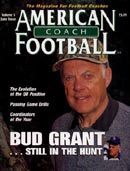Article CategoriesAFM Magazine
|
Q&A With Bud Grant© More from this issueQ: What is your philosophy on staff management? A: Philosophy is something you are asked about a lot, but I am not so sure everybody has a philosophy or that I have a philosophy. Your coaching staff is vitally important; there is no successful team that doesn't have a good staff. As much as coaching might be overrated, your assistant coaches certainly can't be or shouldn't be. They are really the backbone of the team, because they do most of the work. I think it is important for staff to get along with one another. One of the things I look for in a staff is stability. Football is not a very stable business and there is no job security. If you want to embark on a coaching career you are taking a very big step in insecurity. For example, as many as 30 percent of the coaches in the National Football League get fired every yea....The full article can only be seen by subscribers.
|
|
|||||||
| HOME |
MAGAZINE |
SUBSCRIBE | ONLINE COLUMNISTS | COACHING VIDEOS |
Copyright 2026, AmericanFootballMonthly.com
All Rights Reserved





